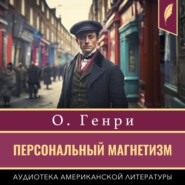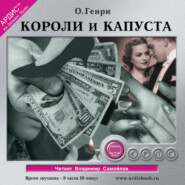По всем вопросам обращайтесь на: info@litportal.ru
(©) 2003-2024.
✖
The Gentle Grafter
Настройки чтения
Размер шрифта
Высота строк
Поля
"'What does this mean, sir?' says the man.
"'When I wore one of these,' says Bill, 'and felt embarrassed, I always done that. Not having one now I had to use yours. I hardly know how to begin, sir, in explaining our business with you, but I guess we'll try your pockets first.'
"Bill Bassett felt in all of them, and looked disgusted.
"'Not even a watch,' he says. 'Ain't you ashamed of yourself, you whited sculpture? Going about dressed like a head-waiter, and financed like a Count! You haven't even got carfare. What did you do with your transfer?'
"The man speaks up and says he has no assets or valuables of any sort. But Bassett takes his hand-satchel and opens it. Out comes some collars and socks and a half a page of a newspaper clipped out. Bill reads the clipping careful, and holds out his hand to the held-up party.
"'Brother,' says he, 'greetings! Accept the apologies of friends. I am Bill Bassett, the burglar. Mr. Peters, you must make the acquaintance of Mr. Alfred E. Ricks. Shake hands. Mr. Peters,' says Bill, 'stands about halfway between me and you, Mr. Ricks, in the line of havoc and corruption. He always gives something for the money he gets. I'm glad to meet you, Mr. Ricks – you and Mr. Peters. This is the first time I ever attended a full gathering of the National Synod of Sharks – housebreaking, swindling, and financiering all represented. Please examine Mr. Rick's credentials, Mr. Peters.'
"The piece of newspaper that Bill Bassett handed me had a good picture of this Ricks on it. It was a Chicago paper, and it had obloquies of Ricks in every paragraph. By reading it over I harvested the intelligence that said alleged Ricks had laid off all that portion of the State of Florida that lies under water into town lots and sold 'em to alleged innocent investors from his magnificently furnished offices in Chicago. After he had taken in a hundred thousand or so dollars one of these fussy purchasers that are always making trouble (I've had 'em actually try gold watches I've sold 'em with acid) took a cheap excursion down to the land where it is always just before supper to look at his lot and see if it didn't need a new paling or two on the fence, and market a few lemons in time for the Christmas present trade. He hires a surveyor to find his lot for him. They run the line out and find the flourishing town of Paradise Hollow, so advertised, to be about 40 rods and 16 poles S., 27 degrees E. of the middle of Lake Okeechobee. This man's lot was under thirty-six feet of water, and, besides, had been preempted so long by the alligators and gars that his title looked fishy.
"Naturally, the man goes back to Chicago and makes it as hot for Alfred E. Ricks as the morning after a prediction of snow by the weather bureau. Ricks defied the allegation, but he couldn't deny the alligators. One morning the papers came out with a column about it, and Ricks come out by the fire-escape. It seems the alleged authorities had beat him to the safe-deposit box where he kept his winnings, and Ricks has to westward ho! with only feetwear and a dozen 15-and-a-half English pokes in his shopping bag. He happened to have some mileage left in his book, and that took him as far as the town in the wilderness where he was spilled out on me and Bill Bassett as Elijah III. with not a raven in sight for any of us.
"Then this Alfred E. Ricks lets out a squeak that he is hungry, too, and denies the hypothesis that he is good for the value, let alone the price, of a meal. And so, there was the three of us, representing, if we had a mind to draw syllogisms and parabolas, labor and trade and capital. Now, when trade has no capital there isn't a dicker to be made. And when capital has no money there's a stagnation in steak and onions. That put it up to the man with the jimmy.
"'Brother bushrangers,' says Bill Bassett, 'never yet, in trouble, did I desert a pal. Hard by, in yon wood, I seem to see unfurnished lodgings. Let us go there and wait till dark.'
"There was an old, deserted cabin in the grove, and we three took possession of it. After dark Bill Bassett tells us to wait, and goes out for half an hour. He comes back with a armful of bread and spareribs and pies.
"'Panhandled 'em at a farmhouse on Washita Avenue,' says he. 'Eat, drink and be leary.'
"The full moon was coming up bright, so we sat on the floor of the cabin and ate in the light of it. And this Bill Bassett begins to brag.
"'Sometimes,' says he, with his mouth full of country produce, 'I lose all patience with you people that think you are higher up in the profession than I am. Now, what could either of you have done in the present emergency to set us on our feet again? Could you do it, Ricksy?'
"'I must confess, Mr. Bassett,' says Ricks, speaking nearly inaudible out of a slice of pie, 'that at this immediate juncture I could not, perhaps, promote an enterprise to relieve the situation. Large operations, such as I direct, naturally require careful preparation in advance. I – '
"'I know, Ricksy,' breaks in Bill Bassett. 'You needn't finish. You need $500 to make the first payment on a blond typewriter, and four roomsful of quartered oak furniture. And you need $500 more for advertising contracts. And you need two weeks' time for the fish to begin to bite. Your line of relief would be about as useful in an emergency as advocating municipal ownership to cure a man suffocated by eighty-cent gas. And your graft ain't much swifter, Brother Peters,' he winds up.
"'Oh,' says I, 'I haven't seen you turn anything into gold with your wand yet, Mr. Good Fairy. 'Most anybody could rub the magic ring for a little left-over victuals.'
"'That was only getting the pumpkin ready,' says Bassett, braggy and cheerful. 'The coach and six'll drive up to the door before you know it, Miss Cinderella. Maybe you've got some scheme under your sleeve-holders that will give us a start.'
"'Son,' says I, 'I'm fifteen years older than you are, and young enough yet to take out an endowment policy. I've been broke before. We can see the lights of that town not half a mile away. I learned under Montague Silver, the greatest street man that ever spoke from a wagon. There are hundreds of men walking those streets this moment with grease spots on their clothes. Give me a gasoline lamp, a dry-goods box, and a two-dollar bar of white castile soap, cut into little – '
"'Where's your two dollars?' snickered Bill Bassett into my discourse. There was no use arguing with that burglar.
"'No,' he goes on; 'you're both babes-in-the-wood. Finance has closed the mahogany desk, and trade has put the shutters up. Both of you look to labor to start the wheels going. All right. You admit it. To-night I'll show you what Bill Bassett can do.'
"Bassett tells me and Ricks not to leave the cabin till he comes back, even if it's daylight, and then he starts off toward town, whistling gay.
"This Alfred E. Ricks pulls off his shoes and his coat, lays a silk handkerchief over his hat, and lays down on the floor.
"'I think I will endeavor to secure a little slumber,' he squeaks. 'The day has been fatiguing. Good-night, my dear Mr. Peters.'
"'My regards to Morpheus,' says I. 'I think I'll sit up a while.'
"About two o'clock, as near as I could guess by my watch in Peavine, home comes our laboring man and kicks up Ricks, and calls us to the streak of bright moonlight shining in the cabin door. Then he spreads out five packages of one thousand dollars each on the floor, and begins to cackle over the nest-egg like a hen.
"'I'll tell you a few things about that town,' says he. 'It's named Rocky Springs, and they're building a Masonic temple, and it looks like the Democratic candidate for mayor is going to get soaked by a Pop, and Judge Tucker's wife, who has been down with pleurisy, is getting some better. I had a talk on these liliputian thesises before I could get a siphon in the fountain of knowledge that I was after. And there's a bank there called the Lumberman's Fidelity and Plowman's Savings Institution. It closed for business yesterday with $23,000 cash on hand. It will open this morning with $18,000 – all silver – that's the reason I didn't bring more. There you are, trade and capital. Now, will you be bad?'
"'My young friend,' says Alfred E. Ricks, holding up his hands, 'have you robbed this bank? Dear me, dear me!'
"'You couldn't call it that,' says Bassett. 'Robbing" sounds harsh. All I had to do was to find out what street it was on. That town is so quiet that I could stand on the corner and hear the tumblers clicking in that safe lock – "right to 45; left twice to 80; right once to 60; left to 15" – as plain as the Yale captain giving orders in the football dialect. Now, boys,' says Bassett, 'this is an early rising town. They tell me the citizens are all up and stirring before daylight. I asked what for, and they said because breakfast was ready at that time. And what of merry Robin Hood? It must be Yoicks! and away with the tinkers' chorus. I'll stake you. How much do you want? Speak up. Capital.'
"'My dear young friend,' says this ground squirrel of a Ricks, standing on his hind legs and juggling nuts in his paws, 'I have friends in Denver who would assist me. If I had a hundred dollars I – '
"Basset unpins a package of the currency and throws five twenties to Ricks.
"'Trade, how much?' he says to me.
"'Put your money up, Labor,' says I. 'I never yet drew upon honest toil for its hard-earned pittance. The dollars I get are surplus ones that are burning the pockets of damfools and greenhorns. When I stand on a street corner and sell a solid gold diamond ring to a yap for $3.00, I make just $2.60. And I know he's going to give it to a girl in return for all the benefits accruing from a $125.00 ring. His profits are $122.00. Which of us is the biggest fakir?'
"'And when you sell a poor woman a pinch of sand for fifty cents to keep her lamp from exploding,' says Bassett, 'what do you figure her gross earnings to be, with sand at forty cents a ton?'
"'Listen,' says I. 'I instruct her to keep her lamp clean and well filled. If she does that it can't burst. And with the sand in it she knows it can't, and she don't worry. It's a kind of Industrial Christian Science. She pays fifty cents, and gets both Rockefeller and Mrs. Eddy on the job. It ain't everybody that can let the gold-dust twins do their work.'
"Alfred E. Ricks all but licks the dust off of Bill Bassett's shoes.
"'My dear young friend,' says he, 'I will never forget your generosity. Heaven will reward you. But let me implore you to turn from your ways of violence and crime.'
"'Mousie,' says Bill, 'the hole in the wainscoting for yours. Your dogmas and inculcations sound to me like the last words of a bicycle pump. What has your high moral, elevator-service system of pillage brought you to? Penuriousness and want. Even Brother Peters, who insists upon contaminating the art of robbery with theories of commerce and trade, admitted he was on the lift. Both of you live by the gilded rule. Brother Peters,' says Bill, 'you'd better choose a slice of this embalmed currency. You're welcome.'
"I told Bill Bassett once more to put his money in his pocket. I never had the respect for burglary that some people have. I always gave something for the money I took, even if it was only some little trifle for a souvenir to remind 'em not to get caught again.
"And then Alfred E. Ricks grovels at Bill's feet again, and bids us adieu. He says he will have a team at a farmhouse, and drive to the station below, and take the train for Denver. It salubrified the atmosphere when that lamentable boll-worm took his departure. He was a disgrace to every non-industrial profession in the country. With all his big schemes and fine offices he had wound up unable even to get an honest meal except by the kindness of a strange and maybe unscrupulous burglar. I was glad to see him go, though I felt a little sorry for him, now that he was ruined forever. What could such a man do without a big capital to work with? Why, Alfred E. Ricks, as we left him, was as helpless as turtle on its back. He couldn't have worked a scheme to beat a little girl out of a penny slate-pencil.
"When me and Bill Bassett was left alone I did a little sleight-of-mind turn in my head with a trade secret at the end of it. Thinks I, I'll show this Mr. Burglar Man the difference between business and labor. He had hurt some of my professional self-adulation by casting his Persians upon commerce and trade.
"'I won't take any of your money as a gift, Mr. Bassett,' says I to him, 'but if you'll pay my expenses as a travelling companion until we get out of the danger zone of the immoral deficit you have caused in this town's finances to-night, I'll be obliged.'
"Bill Bassett agreed to that, and we hiked westward as soon as we could catch a safe train.
"When we got to a town in Arizona called Los Perros I suggested that we once more try our luck on terra-cotta. That was the home of Montague Silver, my old instructor, now retired from business. I knew Monty would stake me to web money if I could show him a fly buzzing 'round the locality. Bill Bassett said all towns looked alike to him as he worked mainly in the dark. So we got off the train in Los Perros, a fine little town in the silver region.
"I had an elegant little sure thing in the way of a commercial slungshot that I intended to hit Bassett behind the ear with. I wasn't going to take his money while he was asleep, but I was going to leave him with a lottery ticket that would represent in experience to him $4,755 – I think that was the amount he had when we got off the train. But the first time I hinted to him about an investment, he turns on me and disencumbers himself of the following terms and expressions.
"'Brother Peters,' says he, 'it ain't a bad idea to go into an enterprise of some kind, as you suggest. I think I will. But if I do it will be such a cold proposition that nobody but Robert E. Peary and Charlie Fairbanks will be able to sit on the board of directors.'
"'I thought you might want to turn your money over,' says I.
"'I do,' says he, 'frequently. I can't sleep on one side all night. I'll tell you, Brother Peters,' says he, 'I'm going to start a poker room. I don't seem to care for the humdrum in swindling, such as peddling egg-beaters and working off breakfast food on Barnum and Bailey for sawdust to strew in their circus rings. But the gambling business,' says he, 'from the profitable side of the table is a good compromise between swiping silver spoons and selling penwipers at a Waldorf-Astoria charity bazar.'
"'Then,' says I, 'Mr. Bassett, you don't care to talk over my little business proposition?'
"'Why,' says he, 'do you know, you can't get a Pasteur institute to start up within fifty miles of where I live. I bite so seldom.'

















